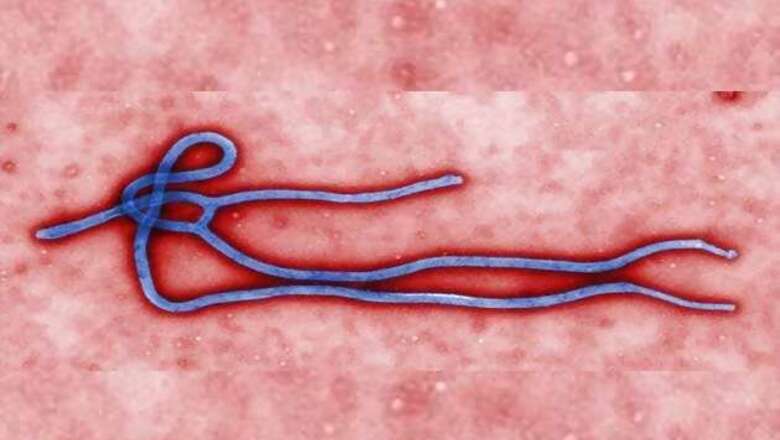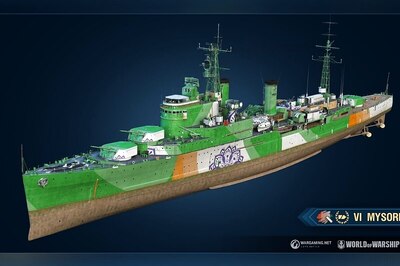
views
Geneva: Two West African nations and a medical charity fighting the world's worst Ebola epidemic chided the World Health Organization (WHO) on Friday for its slow response, saying more action was needed to save victims threatened by the disease and hunger.
With the death toll over 1,000 and still climbing, the UN health agency is facing questions over whether it moved quickly enough to declare the months-old outbreak a "public health emergency of international concern", which it did on August 8.
Medical charity MSF (Doctors Without Borders), which has been one of the most active groups in fighting the outbreak, said its spread had created a "wartime" situation in the worst-affected states of Sierra Leone, Liberia and Guinea. Nigeria is also facing a smaller separate outbreak.
Sierra Leone President Ernest Bai Koroma said his nation's only two treatment centers were "overwhelmed". In neighboring Liberia, Information Minister Lewis Brown said Ebola-affected rural areas quarantined by troops faced serious food shortages.
"We need a more robust response to the nature of the disease and the way it is affecting us," Koroma said in Freetown, adding he had delivered this message to the WHO, which is coordinating international efforts to try to control the outbreak.
The WHO said on Friday the death toll from this epidemic, first declared in Guinea in March, had risen to 1,145, as 76 new deaths were reported in the two days to August 13 in the four nations affected so far.
"If our people are dying, the response should be an extraordinary response because it is an extraordinary situation," Koroma told a news conference, saying his country needed more Ebola treatment centers and medics to staff them.
"Time is of the essence," he added, saying he had seen the world respond to major humanitarian crises, such as the 2010 earthquake in Haiti, and West Africa needed similar help.
Fear of the virus, which causes fever, vomiting and, in its advanced form, severe hemorrhaging and organ failure, is curbing business in Africa and threatening to taint the continent's image as a rising economic star.
In Liberia, which like neighbors Sierra Leone and Guinea has deployed troops to cordon off a tri-border zone which has the highest concentration of Ebola cases, Brown said his country also needed more health personnel and aid.
"The reaction quite frankly is not where we would want it to be to give any serious level of comfort," Brown told Reuters, although he said there had been an improvement.
On Thursday, the WHO said its staff had seen evidence the numbers of reported cases and deaths vastly underestimated the scale of the outbreak and said it would coordinate "a massive scaling up of the international response".
MSF President Joanne Liu, speaking after a 10-day trip to West Africa, compared the current Ebola outbreak to a "wartime" situation. "It's like a front line, it's moving, it's advancing, but we have no clue as to how it is going to go around."
She told reporters in Geneva that the WHO needed to "take leadership" and more experts were urgently needed on the ground. "I think the wake-up call was too late," Liu said.
On April 1, WHO spokesman Gregory Hartl had described the West African outbreak as "relatively small still" after MSF Director General Bruno Jochum had warned it was "unprecedented" and "exceptional".
Threat of hunger
"If we don't stabilize Liberia, we will never stabilize the region. Over the next six months we should get the upper hand on the epidemic; this is my gut feeling," MSF's Liu said.
Brown said his country had "pockets all around the place reporting infection", including the border farming county of Lofa, where a drop in agriculture output because of the outbreak and quarantine measures had created a threat of food shortages.
Liberia had requested emergency food aid from donors.
"We can establish as many checkpoints as we want, but if we cannot get the food and the medical supplies into affected communities, they will leave," Brown said. "We can't ask our people to starve."
International agencies are looking into emergency food deliveries to reach people in Liberia and Sierra Leone cordoned off from the outside world, a World Bank official said.
The worst-affected countries are recovering from a decade of civil wars and have some of the weakest health systems in the world. Liberia has one doctor for every 70,000 people, Sierra Leone one for every 45,000, compared to one for every 360 people in Britain and one for every 410 in the United States.
Alarm over the risk of the disease, which can kill up to 90 percent of those it afflicts and is spread by contact with the bodily fluids of infected persons and animals, has triggered a wave of travel warnings and restrictions, cancellations of events and flight suspensions to the region by some airlines.
The International Olympic Committee (IOC) said on Friday it was prohibiting young athletes from the Ebola-affected region of West Africa from participating in certain events at the Youth Olympic Games in Nanjing, China.
"Emergency within emergency"
MSF's Liu said the "emergency within the emergency" of the current outbreak was the heavy toll inflicted on health workers.
"We found that in the four countries, in terms of healthcare workers, there were 80 deaths and 170 infected," she said, noting that the rainy season was starting in the region.
"What we face today ... is that people don't have access to basic health care. So more today are dying of malaria than are dying of Ebola," Liu said.
Sierra Leone has declared Ebola a national emergency as has Liberia, which is hoping that two of its doctors diagnosed with Ebola can start treatment with some of the limited supply of experimental drug ZMapp.
The WHO said it also welcomed the decision by the Canadian government to donate several hundred doses of an experimental vaccine to support the outbreak response.
Canada's Tekmira Pharmaceuticals Corp is also exploring making more of its experimental Ebola treatment, Chief Executive Officer Mark Murray said.
"A fully tested and licensed vaccine is not expected before 2015," WHO said.
In the United States, a Texas doctor being treated in Atlanta for Ebola after returning from Liberia has continued to improve and hopes to be released "in the near future," the Christian relief group he worked for said.
Nigeria also has declared a national emergency, although it has so far escaped the levels of infection seen in the three other countries, with four dead and 10 infected.


















Comments
0 comment